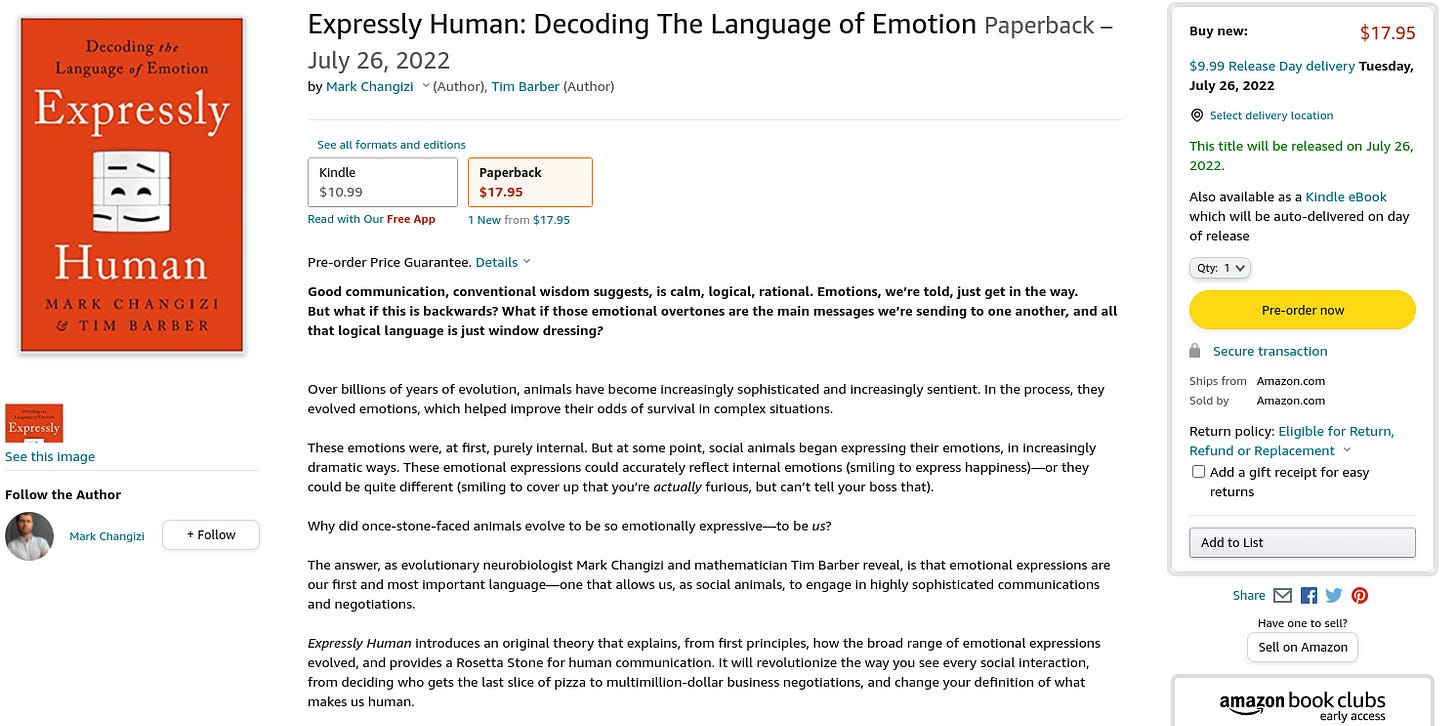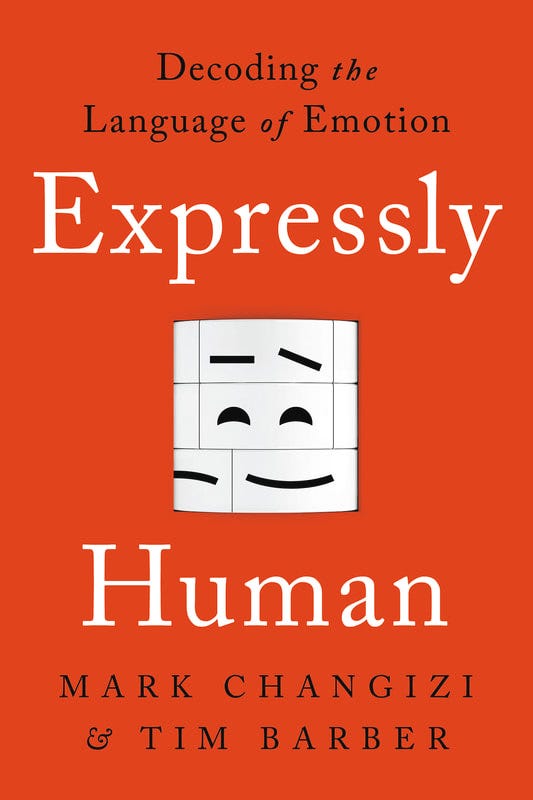Most of you got to know me because of my early voice within the Covid resistance. (I never expected to write that sentence!)
But I have had a long history within the sciences prior to your getting to know me, and have been communicating my research to the general public for nearly twenty years: TED talks, TV shows, articles and coverage hither and thither, and even the first fifty or so Science Moment episodes were on non-Covid topics (unlike the last eighty).
And books. Five of them, on a wide variety of research of mine.
I’m happy to announce the sixth book!
…with co-author Dr. Tim Barber, my long time colleague at 2ai Labs.
We just finished type edits today, which means we can’t really change a thing from now on. Now it’s my publisher’s responsibility to make it look pretty.
It appears in July, and exemplifies why I left academia in 2010: The whole point to being an academic was, for me at least, to be able to work on grand unifying theories, and that takes time. You can’t do that incrementally. Academic university culture completely destroys one’s ability to do that. So I left. (That also kept me aloof.)
This grand unifying theory concerns why we — and social animals generally — came to have emotional expressions. Ten years in the making, we believe we nailed it, capturing what they are, what they’re for, their inter-relationships, how they function, and how they undergird social networks more generally.
And, although we couldn’t have anticipated this, it also serves as the groundwork for our current research — and our research institute, FreeX — on mass hysteria, social networks and free expression. That will be my seventh book, but, alas, my books take time: years to do the research, and often nearly as long to write it up so that it makes sense to intelligent laymen and still serves as the publication of the work. (That’s actually as difficult as the research itself!)
Although it’s not available quite yet, you can pre-order it at Amazon.
In the mean time, you might like my other books, especially VISION REVOLUTION, HARNESSED, and HUMAN 3.0.
I leave you with an excerpt from the preface of EXPRESSLY HUMAN, and I’ll of course be peppering you here and there with other teasers from it over time.
Our First Language
Our story in this dialogue-filled—but also deeply expressive!—book is about the sophisticated ancient “first language” of emotional expressions that social animals, including us, have relied on for millions of years.
We all know this “language.” But most of us don’t appreciate just how powerful it is because it’s utterly intuitive and natural for us, requiring no conscious thought. Therefore we think it must be simple. While we modern humans are all “language! language! language!” bragging about our very recent capability (consider that for most of hominid history, we lived completely without language), the truly winning communication system is this ancient, emotional one. This combination of gestures, looks, body language, tonal shifts, and more is a sophisticated feat of nature, not the “emotional fluff” many of us take it to be. And it’s all geared toward negotiation, navigating conflict, and figuring out how to live symbiotically in communal societies.
It’s fine and dandy to (confidently) say that emotional expressions are social animals’ “first language” and the key to grasping how social animals have dealt with community living. Surely there’s truth in that—nearly everyone thinks emotional expressions are in some way concerned with regulating social interactions. The tricky part, and the topic of this book, is fleshing out exactly how emotional expressions serve as a “language” and why we have the emotionally expressive repertoire we do.
We will have quite a bit to say later in the book about how emotional expressions relate to emotions themselves, but the big puzzle we’re trying to solve isn’t about why we have emotions, or how emotions relate to emotional expressions. Rather, the big problem is about why we have emotional expressions in the first place, and how they had to function in order to do their job: allowing smart social creatures to do their social thing.
Sentences Versus Sentiments
One thing we know about emotional expressions is that, whatever their purpose, they aren’t unusual. Nor are they only occasionally used. Rather, emotional expressions are something social animals use all the time. Even today, in our highly linguistic age, we emotionally express more than we speak, although there’s a bit of an apples-to-oranges issue in trying to quantify that.
When we speak, we’re almost always simultaneously emotionally expressing ourselves through prosody, intonation, emphasis, word choice, facial expressions, and gestures. Unless we’re purposely trying to imitate a robot’s voice, whenever we speak, we’re also emotionally expressing. But we’re also quite often emotionally expressing ourselves without words at all. Language is almost always accompanied by emotional expressions, but emotional expression is not always accompanied by language. In this sense, emotional expressions still dominate language.
When we’re typing or texting, we’re expressly verbally quieter, but we’re by no means expressively silent. You may even notice while moving through the pages of this book that it’s sopping with emotional expressions!
The Actors
Besides being mathematician-scientists who can sometimes barely eke out emotional expressions, who are we, the authors? Here our role is as theorists, ones with considerable experience coming up with altogether new ways of looking at things. You can do experiments in a hundred labs for a hundred lifetimes, but you’ll never get anywhere without the right framework for approaching the problem.
We’ve been working on our grand new way of understanding emotional expressions for more than a decade now, and by the end of the book you’ll think about emotional expressions in entirely new and insightful ways. With hope, you’ll see how they’re not some peculiar inelegant pile of mishmash, but a beautiful and expected consequence of the negotiating-and-compromise system and its demands on social animals.
Enough with introductory stuff. You’ve paid us our consulting fee—the price of this book—and we’ve got our job to do.






https://jasonpowers.substack.com/p/echoes-of-god-in-the-ongoing-struggles
Appreciate your efforts. I updated this piece - and linked to your work. Keep speaking out. We are just getting started in this fight.